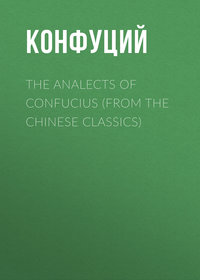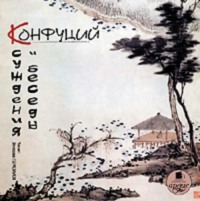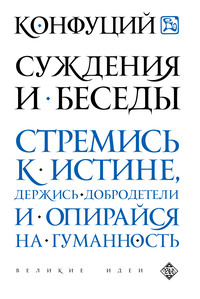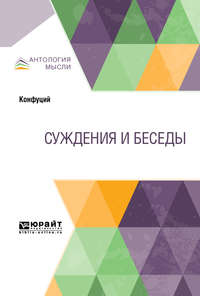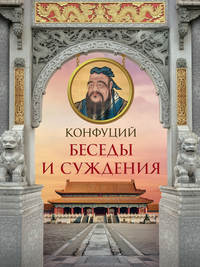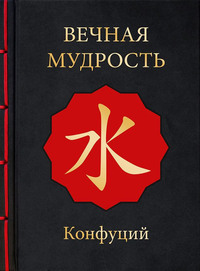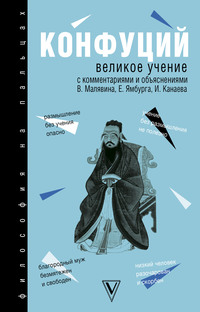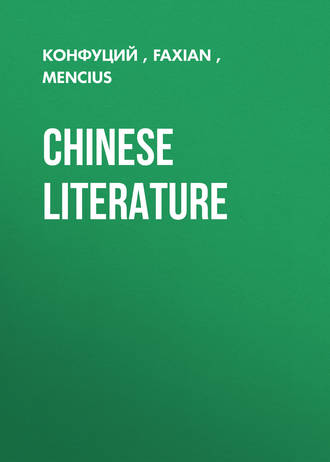 полная версия
полная версияChinese Literature
When Mencius, another day, was seeing King Hwuy of Lëang, the King went and stood with him by a pond, and, looking round on the wild geese and deer, large and small, said, "Do wise and good princes also take pleasure in these things?" Mencius replied, "Being wise and good, they then have pleasure in these things. If they are not wise and good, though they have these things, they do not find pleasure." It is said in the 'Book of Poetry':—
'When he planned the commencement of the Marvellous tower, He planned it, and defined it, And the people in crowds undertook the work, And in no time completed it. When he planned the commencement, he said, "Be not in a hurry." But the people came as if they were his children. The king was in the Marvellous park, Where the does were lying down— The does so sleek and fat; With the white birds glistening. The king was by the Marvellous pond;— How full was it of fishes leaping about!'King Wan used the strength of the people to make his tower and pond, and the people rejoiced to do the work, calling the tower 'the Marvellous Tower,' and the pond 'the Marvellous Pond,' and being glad that he had his deer, his fishes and turtles. The ancients caused their people to have pleasure as well as themselves, and therefore they could enjoy it.
"In the Declaration of T'ang it is said, 'O Sun, when wilt thou expire? We will die together with thee.' The people wished for Këeh's death, though they should die with him. Although he had his tower, his pond, birds and animals, how could he have pleasure alone?"
King Hwuy of Lëang said, "Small as my virtue is, in the government of my kingdom, I do indeed exert my mind to the utmost. If the year be bad inside the Ho, I remove as many of the people as I can to the east of it, and convey grain to the country inside. If the year be bad on the east of the river, I act on the same plan. On examining the governmental methods of the neighboring kingdoms, I do not find there is any ruler who exerts his mind as I do. And yet the people of the neighboring kings do not decrease, nor do my people increase—how is this?"
Mencius replied, "Your Majesty loves war; allow me to take an illustration from war. The soldiers move forward at the sound of the drum; and when the edges of their weapons have been crossed, on one side, they throw away their buff coats, trail their weapons behind them, and run. Some run a hundred paces and then stop; some run fifty paces and stop. What would you think if these, because they had run but fifty paces, should laugh at those who ran a hundred paces?" The king said, "They cannot do so. They only did not run a hundred paces; but they also ran." Mencius said, "Since your Majesty knows this you have no ground to expect that your people will become more numerous than those of the neighboring kingdoms.
"If the seasons of husbandry be not interfered with, the grain will be more than can be eaten. If close nets are not allowed to enter the pools and ponds, the fish and turtles will be more than can be consumed. If the axes and bills enter the hill-forests only at the proper times, the wood will be more than can be used. When the grain and fish and turtles are more than can be eaten, and there is more wood than can be used, this enables the people to nourish their living and do all offices for their dead, without any feeling against any. But this condition, in which the people nourish their living, and do all offices to their dead without having any feeling against any, is the first step in the Royal way.
"Let mulberry trees be planted about the homesteads with their five acres, and persons of fifty years will be able to wear silk. In keeping fowls, pigs, dogs, and swine, let not their time of breeding be neglected, and persons of seventy years will be able to eat flesh. Let there not be taken away the time that is proper for the cultivation of the field allotment of a hundred acres, and the family of several mouths will not suffer from hunger. Let careful attention be paid to the teaching in the various schools, with repeated inculcation of the filial and fraternal duties, and gray-haired men will not be seen upon the roads, carrying burdens on their backs or on their heads. It has never been that the ruler of a State where these results were seen, persons of seventy wearing silk and eating flesh, and the black-haired people suffering neither from hunger nor cold, did not attain to the Royal dignity.
"Your dogs and swine eat the food of men, and you do not know to store up of the abundance. There are people dying from famine on the roads, and you do not know to issue your stores for their relief. When men die, you say, 'It is not owing to me; it is owing to the year,' In what does this differ from stabbing a man and killing him, and then saying, 'It was not I; it was the weapon'? Let your Majesty cease to lay the blame on the year and instantly the people, all under the sky, will come to you."
King Hwuy of Lëang said, "I wish quietly to receive your instructions." Mencius replied, "Is there any difference between killing a man with a stick and with a sword?" "There is no difference," was the answer.
Mencius continued, "Is there any difference between doing it with a sword and with governmental measures?" "There is not," was the answer again.
Mencius then said, "In your stalls there are fat beasts; in your stables there are fat horses. But your people have the look of hunger, and in the fields there are those who have died of famine. This is leading on beasts to devour men. Beasts devour one another, and men hate them for doing so. When he who is called the parent of the people conducts his government so as to be chargeable with leading on beasts to devour men, where is that parental relation to the people? Chung-ne said, 'Was he not without posterity who first made wooden images to bury with the dead?' So he said, because that man made the semblances of men and used them for that purpose; what shall be thought of him who causes his people to die of hunger?"
King Hwuy of Lëang said, "There was not in the kingdom a stronger State than Ts'in, as you, venerable Sir, know. But since it descended to me, on the east we were defeated by Ts'e, and then my eldest son perished; on the west we lost seven hundred li of territory to Ts'in; and on the south we have sustained disgrace at the hands of Ts'oo. I have brought shame on my departed predecessors, and wish on their account to wipe it away once for all. What course is to be pursued to accomplish this?"
Mencius replied, "With a territory only a hundred li square it has been possible to obtain the Royal dignity. If your Majesty will indeed dispense a benevolent government to the people, being sparing in the use of punishments and fines, and making the taxes and levies of produce light, so causing that the fields shall be ploughed deep, and the weeding well attended to, and that the able-bodied, during their days of leisure, shall cultivate their filial piety, fraternal duty, faithfulness, and truth, serving thereby, at home, their fathers and elder brothers, and, abroad, their elders and superiors, you will then have a people who can be employed with sticks which they have prepared to oppose the strong buff-coats and sharp weapons of the troops of Ts'in and Ts'oo.
"The rulers of those States rob their people of their time, so that they cannot plough and weed their fields in order to support their parents. Parents suffer from cold and hunger; elder and younger brothers, wives and children, are separated and scattered abroad. Those rulers drive their people into pitfalls or into the water; and your Majesty will go to punish them. In such a case, who will oppose your Majesty? In accordance with this is the saying, 'The benevolent has no enemy!' I beg your Majesty not to doubt what I said."
Mencius had an interview with King Sëang36 of Lëang. When he came out he said to some persons, "When I looked at him from a distance, he did not appear like a ruler; when I drew near to him, I saw nothing venerable about him. Abruptly he asked me, 'How can the kingdom, all under the sky, be settled?' I replied, 'It will be settled by being united under one sway,'
"'Who can so unite it?' he asked.
"I replied, 'He who has no pleasure in killing men can so unite it.'
"'Who can give it to him?' he asked.
"I replied, 'All under heaven will give it to him. Does your Majesty know the way of the growing grain? During the seventh and eighth months, when drought prevails, the plants become dry. Then the clouds collect densely in the heavens, and send down torrents of rain, so that the grain erects itself as if by a shoot. When it does so, who can keep it back? Now among those who are shepherds of men throughout the kingdom, there is not one who does not find pleasure in killing men. If there were one who did not find pleasure in killing men, all the people under the sky would be looking towards him with outstretched necks. Such being indeed the case, the people would go to him as water flows downwards with a rush, which no one can repress."
King Seuen of Ts'e asked, saying, "May I be informed by you of the transactions of Hwan of Ts'e and Wan of Ts'in?"
Mencius replied, "There were none of the disciples of Chung-ne who spoke about the affairs of Hwan and Wan, and therefore they have not been transmitted to these after-ages; your servant has not heard of them. If you will have me speak, let it be about the principles of attaining to the Royal sway."
The king said, "Of what kind must his virtue be who can attain to the Royal sway?" Mencius said, "If he loves and protects the people, it is impossible to prevent him from attaining it."
The king said, "Is such an one as poor I competent to love and protect the people?" "Yes," was the reply. "From what do you know that I am competent to that?" "I have heard," said Mencius, "from Hoo Heih the following incident:—'The king,' said he, 'was sitting aloft in the hall, when some people appeared leading a bull past below it. The king saw it, and asked where the bull was going, and being answered that they were going to consecrate a bell with its blood, he said, "Let it go, I cannot bear its frightened appearance—as if it were an innocent person going to the place of death." They asked in reply whether, if they did so, they should omit the consecration of the bell, but the king said, "How can that be omitted? Change it for a sheep."' I do not know whether this incident occurred."
"It did," said the king, and Mencius replied, "The heart seen in this is sufficient to carry you to the Royal sway. The people all supposed that your Majesty grudged the animal, but your servant knows surely that it was your Majesty's not being able to bear the sight of the creature's distress which made you do as you did."
The king said, "You are right; and yet there really was an appearance of what the people imagined. But though Ts'e be narrow and small, how should I grudge a bull? Indeed it was because I could not bear its frightened appearance, as if it were an innocent person going to the place of death, that therefore I changed it for a sheep."
Mencius said, "Let not your Majesty deem it strange that the people should think you grudged the animal. When you changed a large one for a small, how should they know the true reason? If you felt pained by its being led without any guilt to the place of death, what was there to choose between a bull and a sheep?" The king laughed and said, "What really was my mind in the matter? I did not grudge the value of the bull, and yet I changed it for a sheep! There was reason in the people's saying that I grudged the creature."
Mencius said, "There is no harm in their saying so. It was an artifice of benevolence. You saw the bull, and had not seen the sheep. So is the superior man affected towards animals, that, having seen them alive, he cannot bear to see them die, and, having heard their dying cries, he cannot bear to eat their flesh. On this account he keeps away from his stalls and kitchen."
The king was pleased and said, "The Ode says,
'What other men have in their minds, I can measure by reflection,'This might be spoken of you, my Master. I indeed did the thing, but when I turned my thoughts inward and sought for it, I could not discover my own mind. When you, Master, spoke those words, the movements of compassion began to work in my mind. But how is it that this heart has in it what is equal to the attainment of the Royal sway?"
Mencius said, "Suppose a man were to make this statement to your Majesty, 'My strength is sufficient to lift three thousand catties, but is not sufficient to lift one feather; my eyesight is sharp enough to examine the point of an autumn hair, but I do not see a wagon-load of fagots,' would your Majesty allow what he said?" "No," was the king's remark, and Mencius proceeded, "Now here is kindness sufficient to reach to animals, and yet no benefits are extended from it to the people—how is this? is an exception to be made here? The truth is, the feather's not being lifted is because the strength was not used; the wagon-load of firewood's not being seen is because the eyesight was not used; and the people's not being loved and protected is because the kindness is not used. Therefore your Majesty's not attaining to the Royal sway is because you do not do it, and not because you are not able to do it."
The king asked, "How may the difference between him who does not do a thing and him who is not able to do it be graphically set forth?" Mencius replied, "In such a thing as taking the T'ae mountain under your arm, and leaping with it over the North Sea, if you say to people, 'I am not able to do it,' that is a real case of not being able. In such a matter as breaking off a branch from a tree at the order of a superior, if you say to people, 'I am not able to do it,' it is not a case of not being able to do it. And so your Majesty's not attaining to the Royal sway is not such a case as that of taking the T'ae mountain under your arm and leaping over the North Sea with it; but it is a case like that of breaking off a branch from a tree.
"Treat with reverence due to age the elders in your own family, so that those in the families of others shall be similarly treated; treat with the kindness due to youth the young in your own family, so that those in the families of others shall be similarly treated—do this and the kingdom may be made to go round in your palm. It is said in the 'Book of Poetry,'
'His example acted on his wife, Extended to his brethren, And was felt by all the clans and States;'Telling us how King Wan simply took this kindly heart, and exercised it towards those parties. Therefore the carrying out of the feeling of kindness by a ruler will suffice for the love and protection of all within the four seas; and if he do not carry it out, he will not be able to protect his wife and children. The way in which the ancients came greatly to surpass other men was no other than this, that they carried out well what they did, so as to affect others. Now your kindness is sufficient to reach to animals, and yet no benefits are extended from it to the people. How is this? Is an exception to be made here?
"By weighing we know what things are light, and what heavy. By measuring we know what things are long, and what short. All things are so dealt with, and the mind requires specially to be so. I beg your Majesty to measure it.—Your Majesty collects your equipments of war, endangers your soldiers and officers and excites the resentment of the various princes—do these things cause you pleasure in your mind?"
The king said, "No. How should I derive pleasure from these things? My object in them is to seek for what I greatly desire."
Mencius said, "May I hear from you what it is that your Majesty greatly desires?" The king laughed, and did not speak. Mencius resumed, "Are you led to desire it because you have not enough of rich and sweet food for your mouth? or because you have not enough of light and warm clothing for your body? or because you have not enough of beautifully colored objects to satisfy your eyes? or because there are not voices and sounds enough to fill your ears? or because you have not enough of attendants and favorites to stand before you and receive your orders? Your Majesty's various officers are sufficient to supply you with all these things. How can your Majesty have such a desire on account of them?" "No," said the king, "my desire is not on account of them." Mencius observed, "Then what your Majesty greatly desires can be known. You desire to enlarge your territories, to have Ts'in and Ts'oo coming to your court, to rule the Middle States, and to attract to you the barbarous tribes that surround them. But to do what you do in order to seek for what you desire is like climbing a tree to seek for fish."
"Is it so bad as that?" said the king. "I apprehend it is worse," was the reply. "If you climb a tree to seek for fish, although you do not get the fish, you have no subsequent calamity. But if you do what you do in order to seek for what you desire, doing it even with all your heart, you will assuredly afterwards meet with calamities." The king said, "May I hear what they will be?" Mencius replied, "If the people of Tsow were fighting with the people of Ts'oo, which of them does your Majesty think would conquer?" "The people of Ts'oo would conquer," was the answer, and Mencius pursued, "So then, a small State cannot contend with a great, few cannot contend with many, nor can the weak contend with the strong. The territory within the seas would embrace nine divisions, each of a thousand li square. All Ts'e together is one of them. If with one part you try to subdue the other eight, what is the difference between that and Tsow's contending with Ts'oo? With the desire which you have, you must turn back to the proper course for its attainment.
"Now, if your Majesty will institute a government whose action shall all be benevolent, this will cause all the officers in the kingdom to wish to stand in your Majesty's court, the farmers all to wish to plough in your Majesty's fields, the merchants, both travelling and stationary, all to wish to store their goods in your Majesty's market-places, travellers and visitors all to wish to travel on your Majesty's roads, and all under heaven who feel aggrieved by their rulers to wish to come and complain to your Majesty. When they are so bent, who will be able to keep them back?"
The king said, "I am stupid and cannot advance to this. But I wish you, my Master, to assist my intentions. Teach me clearly, and although I am deficient in intelligence and vigor, I should like to try at least to institute such a government."
Mencius replied, "They are only men of education, who, without a certain livelihood, are able to maintain a fixed heart. As to the people, if they have not a certain livelihood, they will be found not to have a fixed heart. And if they have not a fixed heart, there is nothing which they will not do in the way of self-abandonment, of moral deflection, of depravity, and of wild license. When they have thus been involved in crime, to follow them up and punish them, is to entrap the people. How can such a thing as entrapping the people be done under the rule of a benevolent man?"
"Therefore, an intelligent ruler will regulate the livelihood of the people, so as to make sure that, above, they shall have sufficient wherewith to serve their parents, and below, sufficient wherewith to support their wives and children; that in good years they shall always be abundantly satisfied, and that in bad years they shall not be in danger of perishing. After this he may urge them, and they will proceed to what is good, for in this case the people will follow after that with readiness.
"But now the livelihood of the people is so regulated, that, above, they have not sufficient wherewith to serve their parents, and, below, they have not sufficient wherewith to support their wives and children; even in good years their lives are always embittered, and in bad years they are in danger of perishing. In such circumstances their only object is to escape from death, and they are afraid they will not succeed in doing so—what leisure have they to cultivate propriety and righteousness?
"If your Majesty wishes to carry out a benevolent government, why not turn back to what is the essential step to its attainment?
"Let mulberry trees be planted about the homesteads with their five acres, and persons of fifty years will be able to wear silk. In keeping fowls, pigs, dogs, and swine, let not their times of breeding be neglected, and persons of seventy years will be able to eat flesh. Let there not be taken away the time that is proper for the cultivation of the field-allotment of a hundred acres, and the family of eight mouths will not suffer from hunger. Let careful attention be paid to the teaching in the various schools, with repeated inculcation of the filial and fraternal duties, and gray-haired men will not be seen upon the roads, carrying burdens on their backs or on their heads. It has never been that the ruler of a State, where these results were seen, the old wearing silk and eating flesh, and the black-haired people suffering neither from hunger nor cold, did not attain to the Royal dignity."
[NOTEBooks II, III, and IV are omitted]
THE SHI-KING
[Metrical translation by James Legge]
INTRODUCTION
The wisdom of Confucius as a social reformer, as a teacher and guide of the Chinese people, is shown in many ways. He not only gave them a code of personal deportment, providing them with rules for the etiquette and ceremony of life, but he instilled into them that profound spirit of domestic piety which is one of the strongest features in the Chinese character. He took measures to secure also the intellectual cultivation of his followers, and his Five Canons contain all the most ancient works of Chinese literature, in the departments of poetry, history, philosophy, and legislation. The Shi-King is a collection of Chinese poetry made by Confucius himself. This great anthology consists of more than three hundred pieces, covering the whole range of Chinese lyric poetry, the oldest of which dates some eighteen centuries before Christ, while the latest of the selections must have been written at the beginning of the sixth century before Christ. These poems are of the highest interest, and even nowadays may be read with delight by Europeans. The ballad and the hymn are among the earliest forms of national poetry, and the contents of the Shi-King naturally show specimens of lyric poetry of this sort. We find there not only hymns, but also ballads of a really fine and spirited character. Sometimes the poems celebrate the common pursuits, occupations, and incidents of life. They rise to the exaltation of the epithalamium, or of the vintage song; at other times they deal with sentiment and human conduct, being in the highest degree sententious and epigrammatic. We must give the credit to Confucius of having saved for us the literature of China, and of having set his people an example in preserving the monuments of a remote antiquity. While the literatures of ancient Greece and Rome have largely perished in the convulsions that followed the breaking up of the Roman empire in Europe, when the kingdom of China fell into disorder and decrepitude this one great teacher stepped forward to save the precious record of historic fact, philosophical thought, and of legislation as well as poetry, from being swept away by the deluge of revolution. Confucius showed his wisdom by the high value he set upon the poetry of his native land, and his name must be set side by side with that of the astute tyrant of Athens who collected the poems of Homer and preserved them as a precious heritage to the Greek world. Confucius has given us his opinion with regard to the poems of the Shi-King. No man, he says, is worth speaking to who has not mastered the poems of an anthology, the perusal of which elevates the mind and purifies it from all corrupt thoughts. Thanks to the work of modern scholarship, English readers can now verify this dictum for themselves.
E. W.
THE SHI-KING
PART I—LESSONS FROM THE STATES
BOOK I
THE ODES OF CHOW AND THE SOUTH
~Celebrating the Virtue of King Wan's Bride~ Hark! from the islet in the stream the voice Of the fish-hawks that o'er their nests rejoice! From them our thoughts to that young lady go, Modest and virtuous, loth herself to show. Where could be found to share our prince's state, So fair, so virtuous, and so fit a mate? See how the duckweed's stalks, or short or long, Sway left and right, as moves the current strong! So hard it was for him the maid to find! By day, by night, our prince with constant mind Sought for her long, but all his search was vain. Awake, asleep, he ever felt the pain Of longing thought, as when on restless bed, Tossing about, one turns his fevered head. Here long, there short, afloat the duckweed lies; But caught at last, we seize the longed-for prize. The maiden modest, virtuous, coy, is found; Strike every lute, and joyous welcome sound. Ours now, the duckweed from the stream we bear, And cook to use with other viands rare. He has the maiden, modest, virtuous, bright; Let bells and drums proclaim our great delight~Celebrating the Industry of King Wan's Queen~ Sweet was the scene. The spreading dolichos Extended far, down to the valley's depths, With leaves luxuriant. The orioles Fluttered around, and on the bushy trees In throngs collected—whence their pleasant notes Resounded far in richest melody. The spreading dolichos extended far, Covering the valley's sides, down to its depths, With leaves luxuriant and dense. I cut It down, then boiled, and from the fibres spun Of cloth, both fine and coarse, large store, To wear, unwearied of such simple dress. Now back to my old home, my parents dear To see, I go. The matron I have told, Who will announcement make. Meanwhile my clothes, My private clothes I wash, and rinse my robes. Which of them need be rinsed? and which need not? My parents dear to visit, back I go.~In Praise of a Bride~ Graceful and young the peach-tree stands; How rich its flowers, all gleaming bright! This bride to her new home repairs; Chamber and house she'll order right. Graceful and young the peach-tree stands; Large crops of fruit it soon will show. This bride to her new home repairs; Chamber and house her sway shall know. Graceful and young the peach-tree stands, Its foliage clustering green and full. This bride to her new home repairs; Her household will attest her rule.~Celebrating T'ae-Sze's Freedom from Jealousy~ In the South are the trees whose branches are bent, And droop in such fashion that o'er their extent All the dolichos' creepers fast cling. See our princely lady, from whom we have got Rejoicing that's endless! May her happy lot And her honors repose ever bring! In the South are the trees whose branches are bent, And droop in such fashion that o'er their extent All the dolichos' creepers are spread. See our princely lady, from whom we have got Rejoicing that's endless! Of her happy lot And her honors the greatness ne'er fade! In the South are the trees whose branches are bent, And droop in such fashion that o'er their extent All the dolichos' creepers entwine. See our princely lady, from whom we have got Rejoicing that's endless! May her happy lot And her honors complete ever shine!~The Fruitfulness of the Locust~ Ye locusts, wingčd tribes, Gather in concord fine; Well your descendants may In numerous bright hosts shine! Ye locusts, wingčd tribes, Your wings in flight resound; Well your descendants may In endless lines be found! Ye locusts, wingčd tribes, Together cluster strong; Well your descendants may In swarms forever throng!~Lamenting the Absence of a Cherished Friend~ Though small my basket, all my toil Filled it with mouse-ears but in part. I set it on the path, and sighed For the dear master of my heart. My steeds, o'er-tasked, their progress stayed, When midway up that rocky height. Give me a cup from that gilt vase— When shall this longing end in sight? To mount that lofty ridge I drove, Until my steeds all changed their hue. A cup from that rhinoceros's horn May help my longing to subdue. Striving to reach that flat-topped hill, My steeds, worn out, relaxed their strain; My driver also sank oppressed:— I'll never see my lord again!~Celebrating the Goodness of the Descendants of King Wan~ As the feet of the lin, which avoid each living thing, So our prince's noble sons no harm to men will bring. They are the lin! As the front of the lin, never forward thrust in wrath, So our prince's noble grandsons of love tread the path. They are the lin! As the horn of the lin, flesh-tipped, no wound to give, So our prince's noble kindred kindly with all live. They are the lin

